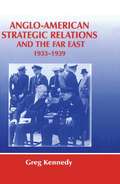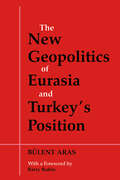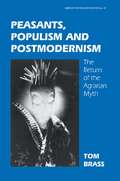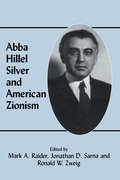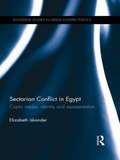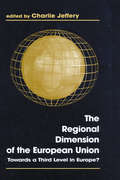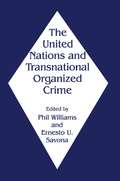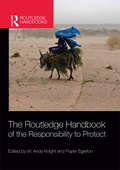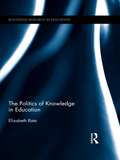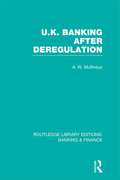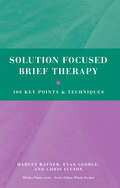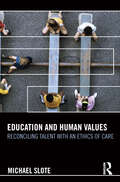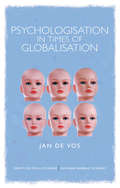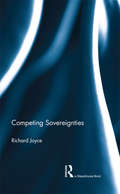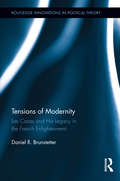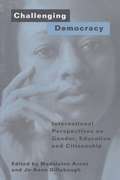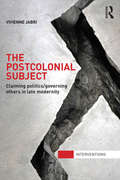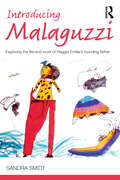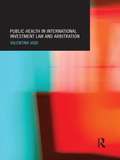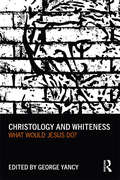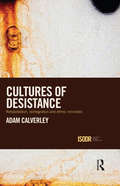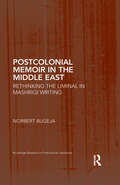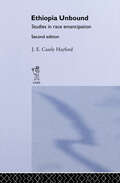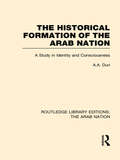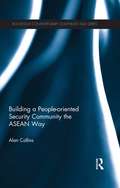Special Collections
Benetech’s Global Certified Accessible Titles
Description: Benetech’s GCA program is the first independent third-party EPUB certification to verify ebook accessibility. By creating content that is born accessible, publishers can meet the needs of all readers. Learn more: https://bornaccessible.benetech.org/
- Table View
- List View
Anglo-American Strategic Relations and the Far East, 1933-1939
by Greg KennedyThis volume charts how the national strategic needs of the United States of America and Great Britain created a "parallel but not joint" relationship towards the Far East as the crisis in that region evolved from 1933-39. In short, it is a look at the relationship shared between the two nations with respect to accommodating one another on certain strategic and diplomatic issues so that they could become more confident of one another in any potential showdowns with Japan.
The New Geopolitics of Eurasia and Turkey's Position
by Bulent ArasThis work explores the geopolitical struggles that are currently underway in the newly independent states of the Caucasus region, showing how many players in the region are coalescing into two opposing blocs. The growing political, military and economic ties amongst the countries of these two blocs stem from a number of developments in the region, most notably the fall of the Soviet Union, and consequently the end of the Cold War and its bi-polar global alliance structure. These blocs are competing for influence in the region, and the rights to exploit and transport the rich energy resources that have been found in the Caspian Sea. The text shows how many actors have been willing to co-operate in other non-energy related issues, in the hope of receiving a financial reward when countries do decide on these matters.
Peasants, Populism and Postmodernism
by Dr Tom BrassTracing the way in which the agrarian myth has emerged and re-emerged over the past century in ideology shared by populism, postmodernism and the political right, the argument in this book is that at the centre of this discourse about the cultural identity of 'otherness'/ 'difference' lies the concept of and innate 'peasant-ness'. In a variety of contextually-specific discursive forms, the 'old' populism of the 1890s and the nationalism and fascism in Europe, America and Asia during the 1920s and 1930s were all informed by the agrarian myth. The postmodern 'new' populism and the 'new' right, both of which emerged after the 1960s and consolidated during the 1990s, are also structured discursively by the agrarian myth, and with it the ideological reaffirmation of peasant essentialism.
Abba Hillel Silver and American Zionism
by Jonathan D. Sarna and Mark A. Raider and Ronald W. ZweigThe essays collected here investigate Rabbi Silver's Zionist political leadership, his impact on American Judaism, ideological orientation and relations with the leaders of the Palestine Jewish community, World Zionist Organization and the Jewish State.
Sectarian Conflict in Egypt
by Elizabeth IskanderIn light of the Egyptian uprising in early 2011, understanding the dynamics that are shaping Egyptian politics and society is more crucial than ever as Egypt seeks to re-define itself after the Mubarak era. One of the most controversial debates concerns the place of religion in Egypt’s political future. This book examines the escalation in religious violence in Egypt since 2005 and the public discourses behind it, revealing some of the complex negotiations that lie behind contestations of citizenship, Muslim-Christian relations and national unity. Focusing on Egypt’s largest religious minority group, the Coptic Orthodox Christians, this book explores how national, ethnic and religious expressions of identity are interwoven in the narratives and usage of the press and Internet. In doing so it offers insights into some of Egypt’s contemporary social and political challenges, and recognises the ways that media are involved in constructing and reflecting formations of identity politics. The author examines in depth the processes through which identity and belonging are negotiated via media discourses within the wider framework of changing political realities in Egypt. Using a combination of methodological approaches - including comprehensive surveys and content analysis - the research offers a fresh perspective on the politics of identity in Egypt.
The Regional Dimension of the European Union
by Charlie JefferyDecision-making within the EU has moved to a third (regional) level of government emerging in the EU policy process alongside the first (Union) and second (member state) levels. Multi-level governance can increasingly be identified. These papers describe and analyse this third level.
The United Nations and Transnational Organized Crime
by Phil Williams and Ernesto U. SavonaTransnational organized crime poses a serious threat to the international community. This volume, the product of a UN conference, discusses the dangers of transnational organized crime and identifies forms of regional, national and international co-operation for its prevention and control, including intelligence networks, preventive strategies, extradition treaties, criminalizing participation in criminal organizations and the elaboration of an international convention. The reduction and subsequent containment of transnational organized crime require governments not only to recognize the seriousness of the challenge, but also to allocate resources commensurate with this challenge. The authors warn that should the international community fail to do this, the prospects for democratic government and the rule of law will be gloomy.
The Routledge Handbook of the Responsibility to Protect
by Frazer Egerton and W. Andy KnightThis Handbook offers a comprehensive examination of the Responsibility to Protect norm in world politics, which aims to end mass atrocities against civilians. The Responsibility to Protect (R2P) is amongst the most significant norms in global politics. As the authoritative guide to R2P, this edited volume gathers together the most respected and insightful voices to address key issues related to this emerging norm. The contributing authors do this over the course of three parts: Part I: The Concept of R2P Part II: Developing and Operationalising R2P Part III: The view from Over Here This book will be of much interest to students of R2P, humanitarian intervention, genocide, human rights, international law, peace studies, international organisations, security studies and IR.
The Politics of Knowledge in Education
by Elizabeth RataThis book explores the decline of the teaching of epistemic, conceptual knowledge in schools, its replacement with everyday social knowledge, and its relation to changes in the division of labor within the global economy. It argues that the emphasis on social knowledge in postmodern and social constructionist pedagogy compounds the problem, and examines the consequences of these changes for educational opportunity and democracy itself.
UK Banking After Deregulation
by Andy MullineuxHow does financial deregulation affect the operation of the banking system in the UK? What are the consequences of the development of an electronic banking system? This book addresses these and other important questions in a survey of UK change in the financial sector and in banking in particular. Attention is given to the role of building societies after the ‘big bang’ and the implications for retail banking of competition in the housing finance market. Both the long and short term implications of regulatory reform for banks are dealt with together with the role of the Bank of England and what the changes have meant in terms of international banking. Concentrating on the three main areas of change deregulation, regulatory reform and technical innovation the book is an important pointer to the shape of banking in the late 1980s and early 1990s.
Solution Focused Brief Therapy
by Evan George and Harvey Ratner and Chris IvesonSolution Focused Brief Therapy: 100 Key Points and Techniques provides a concise and jargon-free guide to the thinking and practice of this exciting approach, which enables people to make changes in their lives quickly and effectively. It covers: The history and background to solution focused practice The philosophical underpinnings of the approach Techniques and practices Specific applications to work with children and adolescents, (including school-based work) families, and adults How to deal with difficult situations Organisational applications including supervision, coaching and leadership. Frequently asked questions This book is an invaluable resource for all therapists and counsellors, whether in training or practice. It will also be essential for any professional whose job it is to help people make changes in their lives, and will therefore be of interest to social workers, probation officers, psychiatric staff, doctors, and teachers, as well as those working in organisations as coaches and managers.
Education and Human Values
by Michael SloteTwo of our greatest educational theorists, John Dewey and Nel Noddings, have been reluctant to admit that some students are simply more talented than others. This was no doubt due to their feeling that such an admission was inconsistent with democratic concern for everyone. But there really is such a thing as superior talent; and the present book explains how that admission is compatible with our ideals of caring (and democracy). Traditionalists confident that some disciplines are more important than others haven’t worried that that way of putting things threatens to make those who are excluded feel quite bad about themselves. But an ethics of care can show us how to make these differences much less hurtful and more morally acceptable than anything that has been proposed by traditionalists. So the present book offers a middle way between the denial of the reality of superior talents and an insensitive insistence on that reality. It argues that care ethics gives us a way to do this, and it bases that claim largely on the promise of such an ethics for moral education in schools and in homes. It is argued on psychological grounds that caring can only take place on the basis of empathy for others, and the book shows in great detail how empathy can be encouraged or develop in school and home contexts. Other approaches to moral education—like Kantian cognitive-developmentalism and Aristotelian character education—can’t account for (increasing) moral motivation in the way that an emphasis on the development of empathy allows. And in the end, it is only students educated via care ethics who will be sensitive to one another in a way that largely undercuts the negative psychological impact of educational institutions and practices that acknowledge the greater talents or creativity that some students have.
Psychologisation in Times of Globalisation
by Jan De VosToday more than ever, our understanding of ourselves, others and the world around us is described in psychological terms. Psychologists deeply influence our society, and psychological-discourse has invaded companies, advertising, culture, politics, and even our social and family life. Moreover, psychologisation has become a global process, applied to situations such as torture, reality TV and famine. This book analyses this ‘overflow of psychology’ in the three main areas of science, culture and politics. The concept of psychologisation has become crucial to current debates in critical psychology. De Vos combines these debates with insights from the fields of critical theory, philosophy and ideology critique, to present the first book-length argument that seriously considers the concept of psychologisation in these times of globalisation. The book contains numerous real-world examples making it an accessible and engaging analysis that should be of interest to researchers, postgraduates and undergraduate students of psychology and philosophy.
Competing Sovereignties
by Richard JoyceCompeting Sovereignties provides a critique of the concept of sovereignty in modernity in light of claims to determine the content of law at the international, national and local levels. In an argument that is illustrated through an analysis of debates over the control of intellectual property law in India, Richard Joyce considers how economic globalization and the claims of indigenous communities do not just challenge national sovereignty - as if national sovereignty is the only kind of sovereignty - but in fact invite us to challenge our conception of what sovereignty ‘is’. Combining theoretical research and reflection with an analysis of the legal, institutional and political context in which sovereignties 'compete', the book offers a reconception of modern sovereignty - and, with it, a new appreciation of the complex issues surrounding the relationship between international organisations, nation states and local and indigenous communities.
Tensions of Modernity
by Daniel R. BrunstetterPolitics today is marked by tension between claims of universal human rights and diversity. From the war on terror to immigration, one of the major challenges facing liberalism is to understand the scope of equality in a world in which certain peoples are perceived to reject and/or violently resist democratic principles. This book revisits Europe’s initial encounter with the Native Americans of the New World to shed light on how the West’s initial defense of so-called ‘barbarians’ has influenced the way we think about diversity today, and elucidate the arguments of exclusion that unconsciously permeate the moral world we live in. In doing so, Daniel R. Brunstetter traces Bartolomé de Las Casas’s oft heralded defense of the Native Americans in the sixteenth century through the French Enlightenment. While this defense has been rightly lauded as an early example of human rights discourse, tracing Las Casas’s arguments into the eighteenth century shows how his view of equality enabled arguments legitimizing the annihilation by ‘just’ war of those perceived to be ‘barbarians’. This philosophical narrative can be useful when thinking about concepts such as just war, multiculturalism, and immigration, or any area in which politics confronts radical difference.
Challenging Democracy
by Madeleine Arnot and Jo-Anne DillaboughThis collection establishes a highly topical, new, international field of study: that of gender, education and citizenship. It brings together for the first time important cutting-edge research on the contribution of the educational system to the formation of male and female citizens. It shows how gender relations operate behind apparently neutral concepts of liberal democratic citizenship and citizenship education.The editors asked leading international educationalists to describe the theoretical frameworks and methodologies they used to research gender and citizenship.Challenging Democracy suggests ways in which the educational system could help develop genuinely inclusive democratic societies in which men and women play an equal role in shaping the meaning of citizenship.
The Postcolonial Subject
by Vivienne JabriThis book places the lens on postcolonial agency and resistance in a social and geopolitical context that has witnessed great transformations in international politics. What does postcolonial politics mean in a late modern context of interventions that seek to govern postcolonial populations? Drawing on historic and contemporary articulations of agency and resistance and highlighting voices from the postcolonial world, the book explores the transition from colonial modernity to the late modern postcolonial era. It shows that at each moment wherein the claim to politics is made, the postcolonial subject comes face to face with global operations of power that seek to control and govern. As seen in the Middle East and elsewhere, these operations have variously drawn on war, policing, as well as pedagogical practices geared at governing the political aspirations of target societies. The book provides a conceptualisation of postcolonial political subjectivity, discusses moments of its emergence, and exposes the security agendas that seek to govern it. Engaging with political thought, from Hannah Arendt, to Frantz Fanon, Michel Foucault, and Edward Said, among other critical and postcolonial theorists, and drawing on art, literature, and film from the postcolonial world, this work will be of great interest to students and scholars of critical international relations, postcolonial theory, and political theory.
Introducing Malaguzzi
by Sandra SmidtLoris Malaguzzi is recognised as the founder of the extraordinary programmes of preschool education that developed after the war in Reggio Emilia, Italy. Deeply embedded in the cultures and communities they serve, these unique preschools have justifiably become famous throughout the world. In this accessible and engaging text, Sandra Smidt examines how Malaguzzi’s philosophy developed out of his personal experiences of growing up in post-fascist Italy. His ideas are explored and illustrated throughout by examples relating to everyday early years practice. The key themes explored include: relationships — the importance of relationships, culture and contexts to learning within any setting and beyond; transparency — the importance of listening and documentation to understanding and sharing learning; questioning — inviting children to not only answer questions but raise them, allowing them to be equal partners in all learning situations; creativity — finding ways of enabling children to use all the expressive languages they can find to express and share their ideas; equity and fairness — involving the community in all decision-making and discussions, to ensure that early childhood education is accessible and relevant to all children.? This book will be of benefit to all those working with young children and essential reading for students on early childhood education programmes.
Public Health in International Investment Law and Arbitration
by Valentina VadiIs a State free to adopt measures to protect the public health of its citizens? If so, what are the limits, if any, to such regulatory powers? This book addresses these questions by focusing on the clash between the regulatory autonomy of the state and international investment governance. As a wide variety of state regulations allegedly aimed at protecting public health may interfere with foreign investments, a tension exists between the public health policies of the host state and investment treaty provisions. Under most investment treaties, States have waived their sovereign immunity, and have agreed to give arbitrators a comprehensive jurisdiction over what are essentially regulatory disputes. Some scholars and practitioners have expressed concern regarding the magnitude of decision-making power allocated to investment treaty tribunals. This book contributes to the current understanding of international investment law and arbitration, addressing the fundamental question of whether public health has and/or should have any relevance in contemporary international investment law and policy. With a focus on the ‘clash of cultures’ between international investment law and public health, the author critically analyses the emerging case law of investment treaty arbitration and considers the theoretical interplay between public health and investor rights in international investment law. The book also explores the interplay between investment law and public health in practice, focusing on specific sectors such as pharmaceutical patents, tobacco regulation and environmental health. It then goes on to analyze the available means for promoting consideration of public health in international investment law and suggests new methods and approaches to better reconcile public health and investor rights.
Christology and Whiteness
by George YancyThis book explores Christology through the lens of whiteness, addressing whiteness as a site of privilege and power within the specific context of Christology. It asks whether or not Jesus’ life and work offers theological, religious and ethical resources that can address the question of contemporary forms of white privilege. The text seeks to encourage ways of thinking about whiteness theologically through the mission of Jesus. In this sense, white Christians are encouraged to reflect on how their whiteness is a site of tension in relation to their theological and religious framework. A distinguished team of contributors explore key topics including the Christology of domination, different images of Jesus and the question of identification with Jesus, and the Black Jesus in the inner city.
Cultures of Desistance
by Adam CalverleyIn contrast to the widespread focus on ethnicity in relation to engagement in offending, the question of whether or not processes associated with desistance – that is the cessation and curtailment of offending behaviour – vary by ethnicity has received less attention. This is despite known ethnic differences in factors identified as affecting disengagement from offending, such as employment, place of residence, religious affiliation and family structure, providing good reasons for believing differences would exist. This book seeks to address this oversight. Using data obtained from in-depth qualitative interviews it investigates the processes associated with desistance from crime among offenders drawn from some of the principal minority ethnic groups in the United Kingdom. Cultures of Desistance explores how structural (families, friends, peer groups, employment, social capital) and cultural (religion, values, recognition) ethnic differences affected the environment in which their desistance took place. For Indians and Bangladeshis, desistance was characterised as a collective experience involving their families actively intervening in their lives. In contrast, Black and dual heritage offenders’ desistance was a much more individualistic endeavour. The book suggests a need for a research agenda and justice policy that are sensitive to desisters’ structural location, and for a wider culture which promotes and supports desisters’ efforts.
Postcolonial Memoir in the Middle East
by Norbert BugejaThis book reconsiders the notion of liminality in postcolonial critical discourse today. By visiting Mashriqi writers of memoir, Bugeja offers a unique intervention in the understanding of 'in-between' and ‘threshold’ states in present-day postcolonialist thought. His analysis situates liminal space as a fraught form of consciousness that mediates between conditions of historical contingency and the memorializing present. Within the present Mashriqi memoir form, liminal spaces may be read as articulations of 'representational spaces' — narrative spaces that, based as they are within the histories of local communities, are nonetheless redolent with memorial and imaginary elements. Liminal consciousness today, Bugeja argues, is a direct consequence of the impact of volatile present-day memories on the re-conception of the open wounds of history. Incisive readings of life-writings by Mourid Barghouti, Amin Maalouf, Orhan Pamuk, Amos Oz, and Wadad Makdisi Cortas demonstrate the double-edged representational chasm that opens up when present acts of memorializing are brought to bear upon the elusive histories of the early-twentieth-century Mashriq. Sifting through the wide-ranging theoretical literature on liminality and challenging received views of the concept, this book proposes a nuanced, materialist, and original rethinking of the liminal as a more vigilant outlook onto the political, literary and historical predicaments of the contemporary Middle East.
Ethiopia Unbound
by J.E.Caseley HayfordFirst published in 1969. Routledge is an imprint of Taylor & Francis, an informa company.
The Historical Formation of the Arab Nation
by A A DuriThis book is a comprehensive examination of the historical process of social formation that gave rise to the communal consciousness of the Arab nation and determined its sense of identity. It aims to provide a historical context for the assessment of prevailing concepts and suggests hypotheses for the development of modern Arab consciousness. The book firstly traces Arab origins and the formation of Arab societies after the emergence of Islam, assessing the perspectives and factors that shaped the rise of the Arab nation in both practical and intellectual terms. It then examines the beginning of the Arab awakening and the course of its development in the latter half of the nineteenth century and the first two decades of the twentieth, focusing on the emergence of a nationalist perspective in the development of intellectual positions on patriotism and Arabism.
Building a People-Oriented Security Community the ASEAN way
by Alan CollinsASEAN has declared its intention to create a security community in Southeast Asia that is people-orientated. This book evaluates ASEAN’s progress, and in doing so examines three matters of concern. The book firstly looks at the importance of constitutive norms to the workings of security communities, by identifying ASEAN’s constitutive norms and the extent to which they act as a help of hindrance in establishing a security community. It then moves on to how ASEAN has interpreted people-orientated as empowering civil society organisations to be community stakeholders. The book discusses the uncertainty between how ASEAN envisages their role, and the role they themselves expect to have. Civil society actors are seeking to influence what sort of community evolves and their ability to interact with the state elite is evaluated to determine what interpretation of people-oriented is likely to emerge. Thirdly, in order to make progress ASEAN has sought to achieve cooperation among its member states in functional areas. The book examines this interest in functional cooperation through case studies on human rights, HIV/AIDS and disaster management. By discussing the notion of ASEAN being people-orientated, and how it engages with ‘the people’, the book provides important insights into what type of community ASEAN in building, as well as furthering our understanding on security communities more broadly.
